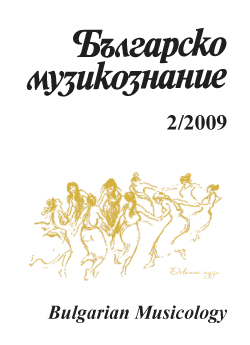Явор Конов: „Лексикографско, историографско & библиографско наследство на Себастиан дьо Бросар (1655–1730) – духовник, музикант & ерудит”
Yavor Konov: Lexicographic, Historiographic & Bibliographic Legacy of Sébastiene de Brossard (1655–1730) – Ecclesiastic, Musician & Erudite
Author(s): Svetlana KujumdzievaSubject(s): Music
Published by: Институт за изследване на изкуствата, Българска академия на науките
Summary/Abstract: The recently published book of Prof. Yavor Konov is a valuable edition. After the introduction to the Bulgarian musicology of one of the earliest Western music tractates from the end of 17th and the very beginning of the 18th century Principles of the Harpsichord by M. de St. Lambert, now subject of presentation is the first music dictionary, published in spoken French by Sébastien de Brossard Dictionaire de musique, contenant une explication des Termes Grecs, Latins, Italiens, & François, les plus usitez dans la Musique. With this dictionary, as Prof. Konov highlights, has been put the beginning of the modern music lexicography. The author translated de Brossard’s dictionary into Bulgarian, studying it in the broad context of its theory subject matter – from polyphony through counterpoint to basso continuo, with a glance into the vocal sacred music (the Gregorian choral), the sacred instrumental music, as well as the secular vocal and instrumental music. Analyzed are the music terminology used in the dictionary and the collection of de Brossard’s manuscripts and books. Although with stipulations about the limited space, the discussed problems are numerous. The author succeeds to extract maximum information from the sources he worked with, outlining panoramic picture of the epoch and especially the studied aspects of its music. Namelythis picture, that brings up and discusses a number of questions related to an unknown topic in the Bulgarian musicology, makes the book especially valuable. Its importance is that diverse aspects might be discussed from the point of view of crossing a bridge between the European West and East. Provocative materials for comparison in this direction are given by a number of author’s observations and conclusions in the field of music methodology, history, theory and aesthetics, as well as in other still insufficiently studied music disciplines, all part of Sébastien de Brossard’s work.
Journal: Българско музикознание
- Issue Year: 2009
- Issue No: 2
- Page Range: 117-121
- Page Count: 5
- Language: Bulgarian
- Content File-PDF

